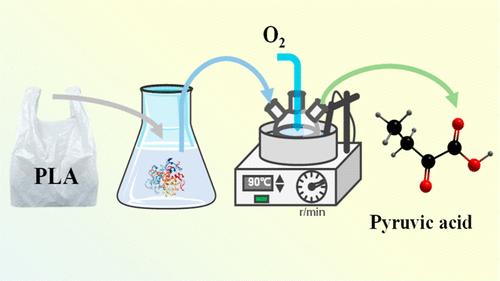当前位置:
X-MOL 学术
›
ACS Sustain. Chem. Eng.
›
论文详情
Our official English website, www.x-mol.net, welcomes your
feedback! (Note: you will need to create a separate account there.)
One-Step Synthesis of PtPb Alloy Nanoparticles Via Wet Chemical Method for the Upgraded Recycling of PLA Plastic
ACS Sustainable Chemistry & Engineering ( IF 7.1 ) Pub Date : 2024-12-21 , DOI: 10.1021/acssuschemeng.4c06032 Wenlong Pang, Bin Li, Yufeng Wu, Yu Zhang, Jun Yang, Zhongxun Tian, Shaonan Tian, Jianjun Li
ACS Sustainable Chemistry & Engineering ( IF 7.1 ) Pub Date : 2024-12-21 , DOI: 10.1021/acssuschemeng.4c06032 Wenlong Pang, Bin Li, Yufeng Wu, Yu Zhang, Jun Yang, Zhongxun Tian, Shaonan Tian, Jianjun Li

|
Biodegradable plastics such as polylactic acid (PLA) have been extensively applied in numerous fields. Although PLA is degradable in natural environments, its decomposition postdisposal leads to resource wastage. Herein, we first employ enzymatic hydrolysis to degrade PLA. Subsequently, PtPb alloy nanoparticles are synthesized in a single step via a wet chemical method, catalyzing the reformation of the PLA enzymatic hydrolysis products into higher-value chemicals (pyruvic acid). Under conditions of an oxygen flow rate of 60 mL/min, a reaction temperature of 90 °C, and a reaction duration of 60 min, the conversion rate of lactic acid catalytic oxidative dehydrogenation to pyruvic acid reaches an impressive 96.86%, with a selectivity of 95.69%. Moreover, this catalyst exhibits satisfactory stability. Experimental and density functional theory (DFT) calculations are combined to ascertain the active state changes of PtPb and the reaction pathways for the catalytic oxidative dehydrogenation of lactic acid to pyruvic acid, as well as the free energy changes of different catalysts in this transformation. In this work, we employ a simple synthetic strategy to specifically investigate the impact of PtPb alloy nanoparticles under various conditions on the catalytic oxidative dehydrogenation of lactic acid to pyruvic acid, offering a new research avenue for the waste treatment and resource utilization of biodegradable plastics in the future.
中文翻译:

湿化学法一步法合成 PtPb 合金纳米颗粒用于 PLA 塑料的升级回收
聚乳酸 (PLA) 等可生物降解塑料已广泛应用于众多领域。虽然 PLA 在自然环境中是可降解的,但其处置后分解会导致资源浪费。在此,我们首先采用酶水解来降解 PLA。随后,通过湿化学方法一步合成 PtPb 合金纳米颗粒,催化 PLA 酶解产物重整为更高价值的化学品(丙酮酸)。在氧气流速 60 mL/min、反应温度 90 °C、反应持续时间 60 min 的条件下,乳酸催化氧化脱氢制丙酮酸的转化率达到了令人印象深刻的 96.86%,选择性为 95.69%。此外,该催化剂表现出令人满意的稳定性。将实验和密度泛函理论 (DFT) 计算相结合,以确定 PtPb 的活性态变化和乳酸催化氧化脱氢制丙酮酸的反应途径,以及不同催化剂在该转化过程中的自由能变化。在这项工作中,我们采用一种简单的合成策略,专门研究了 PtPb 合金纳米颗粒在各种条件下对乳酸催化氧化脱氢为丙酮酸的影响,为未来可生物降解塑料的废物处理和资源化利用提供了新的研究途径。
更新日期:2024-12-21
中文翻译:

湿化学法一步法合成 PtPb 合金纳米颗粒用于 PLA 塑料的升级回收
聚乳酸 (PLA) 等可生物降解塑料已广泛应用于众多领域。虽然 PLA 在自然环境中是可降解的,但其处置后分解会导致资源浪费。在此,我们首先采用酶水解来降解 PLA。随后,通过湿化学方法一步合成 PtPb 合金纳米颗粒,催化 PLA 酶解产物重整为更高价值的化学品(丙酮酸)。在氧气流速 60 mL/min、反应温度 90 °C、反应持续时间 60 min 的条件下,乳酸催化氧化脱氢制丙酮酸的转化率达到了令人印象深刻的 96.86%,选择性为 95.69%。此外,该催化剂表现出令人满意的稳定性。将实验和密度泛函理论 (DFT) 计算相结合,以确定 PtPb 的活性态变化和乳酸催化氧化脱氢制丙酮酸的反应途径,以及不同催化剂在该转化过程中的自由能变化。在这项工作中,我们采用一种简单的合成策略,专门研究了 PtPb 合金纳米颗粒在各种条件下对乳酸催化氧化脱氢为丙酮酸的影响,为未来可生物降解塑料的废物处理和资源化利用提供了新的研究途径。































 京公网安备 11010802027423号
京公网安备 11010802027423号